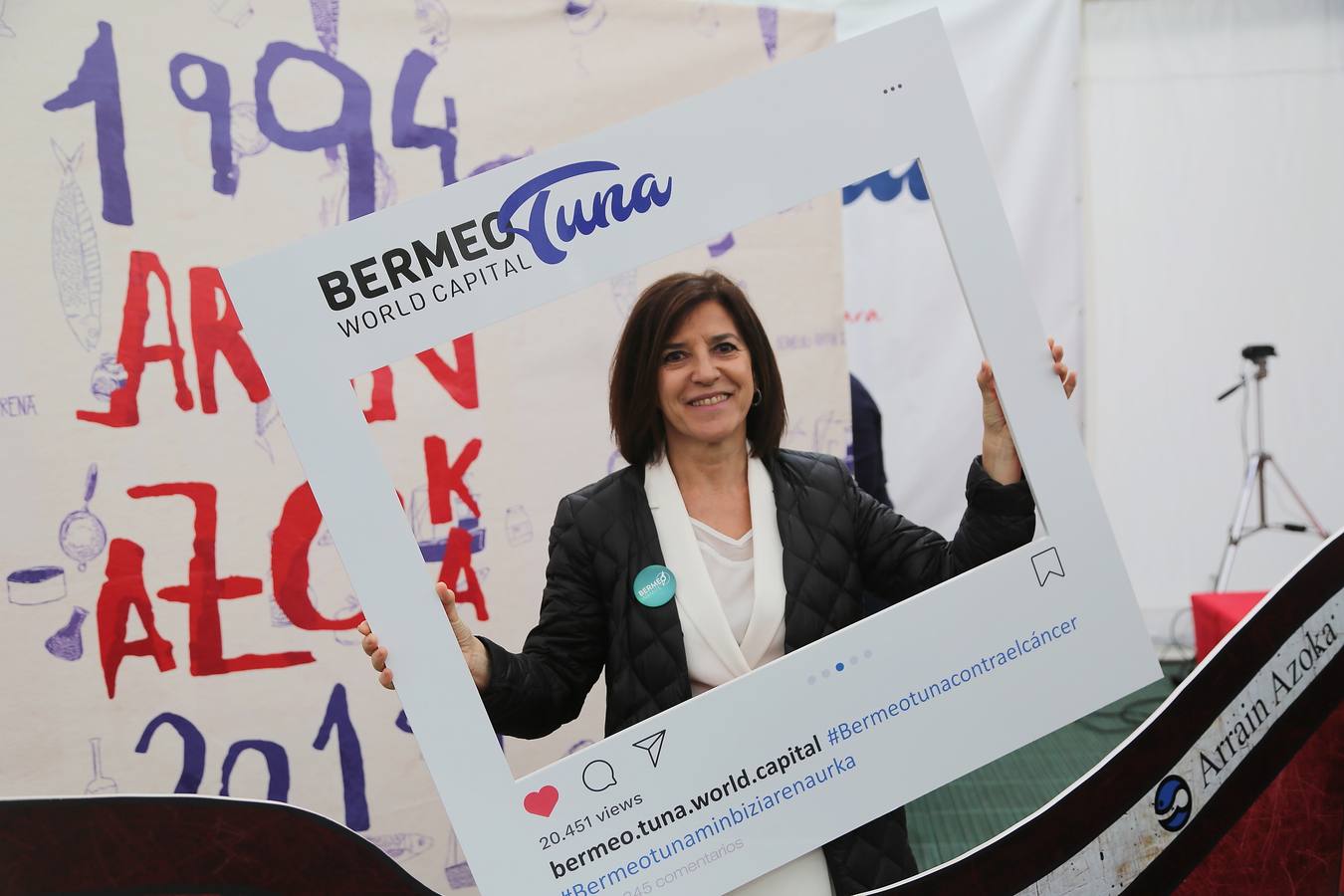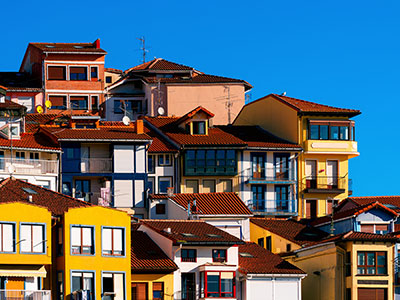
“Whoever visits Bermeo, will realise why we’re the Tuna World Capital”
Izaskun Bilbao
Member of the European Parliament
Izaskun Bilbao, the first woman to chair the Basque Parliament, is from a Bermeo fishing family. She has been a member of the European Parliament in Brussels representing PNV since 2009 working on the Fisheries committee among others. She knows the sector reality in-depth, emphasises the importance of giving prestige to this activity and making known the effort and risk implicit in working at sea, and admits she misses the seafaring town which she boasts of whenever she can. She states: “Whoever visits Bermeo, will realise why we’re the Tuna World Capital”.
You’re from a fishing family; do you think fishermen’s work is appreciated?
No, not at all. I’ve always said the price paid for a fish doesn’t sufficiently compensate what the work of the people at sea means, the conditions which they sometimes have to face and what it means for those waiting on the land. And, what can I say about the work of the women, essential yet totally invisible for so long. Without them, without the “neskatillas” (women of the sea), netters, packers, etc., it would have been impossible to maintain this sector.
What do you remember?
I remember my mother and her companions in the harbour, unloading and cleaning boxes of anchovies, and carrying them on wheelbarrows as if they were jugglers all the way to the fish factories. Fortunately, these women are now getting their professional status recognised. The sea’s a tough mistress not to mention income is uncertain, you never know what you’re going to come across there and you don’t know whether your catch quota will be there the next season. If we add to this a distant incomprehensible and even negative attitude from the DG Mare (Directorate-General for Maritime Affairs and Fisheries) at this time in relation to the messages from and needs of the sector, then the panorama is worrying to say the least.
What do you mean?
That, in my opinion, this attitude of the community authorities is result of a lack of dialogue with and knowledge of the sector encouraging an attitude of distrust towards the extraction activity. I’ve spent years insisting that from the sector itself we also have to make an effort to give this activity prestige, make known the effort and risk involved in working at sea. To value the contribution we make to food safety in Europe, to the extension of European values worldwide likewise co-operation with third countries. We need a positive story. Unfortunately, speeches based on topics when not false hide the reality, which is that the European sector is the first interested party in the preservation of the marine medium and is acting in consequence by leading innovation and sustainability in its activities at sea.
It is necessary that from the sector itself we make an effort to give prestige to this activity, to make known the effort and risk involved in working at sea
We defend the sector and its people
In the parliamentary group Renew Europe you’re the Fishing co-ordinator, what are your major lines of work?
They’re different yet multiple; however, in summary we defend the sector and its people. We endeavour to make the alleged marine medium defenders understand that the coastal communities are also part of the same, those communities have made an enormous effort to preserve it. They’re the first to be interested in sustainability and deserve support to preserve heritage of all kinds: cultural, gastronomic, production, natural, etc., which is preserved thanks to the coastal communities.
The Bermeo tuna fleet is a global reference regarding the best sustainable fishing practices. What would you say to the collectives or groups who equate fishing with the predators of the marine medium?
To simply learn about the sector in-depth, listen to the workers there, come over and get to know us and what we do. Unfortunately, behind much of that criticism there are two problems. Sometimes it’s a question of business model, and sensationalism sells, furthermore, some of this criticism and its dissemination respond to that reality. The truth of the matter is that this kind of attitude is seriously hindering the European tuna fleet which has high social and environmental standards; yet nobody questions the ever greater presence of the Asian fleet in these same waters, which appears to have carte blanche.
It seems the threat of pirates has moved to the Gulf of Guinea. Has the EU taken any steps to protect the ships? How would you value the Atalanta operation?
The Atalanta operation mapped out the path to follow. Nevertheless, requested by the sector, we asked in Brussels and Madrid to have military personnel on board our ships like the French fleet, as recommended by several international reports. However, this was impossible due to the Government’s refusal; but a solution which worked was reached. It seems the threat in the Gulf of Guinea is on the increase; moreover, it’s not exclusively focused on fishing ships. It essentially affects merchant ships. We need to provide the ships with security so they can continue with their activity. We know the formulas which function, so they’ll have to be put in place again.
Has the EU adopted any measures to reduce confusion with the labelling of fish as “vegetable” or ‘vegan’, which is damaging the canning industry?
There are more and more product labels using the names of fish. I think it’s scandalous to allow a label with ‘Hake Fillets’ occupying the entire product surface while below there’s a virtually illegible font requiring enormous effort to find out that it’s really a “vegetable product imitating a fish fillet in batter made from soy protein”. That’s misleading publicity which damages both the fishing sector and consumer rights, this is why I’d like the committee to uphold very firm criteria like those I’ve seen for example regarding palm honey or denomination of vegetable drinks. Despite working on this for 14 years I don’t see any political willingness.
Authenticity

Do you boast about Bermeo in Brussels? Do you miss the Cantabrian sea brine?
I encourage everybody to visit Bermeo whenever I can. There’s not one parliamentary intervention about fishing where I haven’t referred to my origin and reminded my place in this institution is transitory. My vocation to represent this reality upholds this, my vocation to bring the voice here of a sector which both needs and deserves to be heard much more. That’s why even though I greatly miss the brine, my medium, I try to recall it by setting out here what I believe it to mean, i.e. authenticity. As it’s both public and well-known, I always use every opportunity I get to be in Bermeo.
What would you say to somebody who doesn’t know this seafaring town to go and visit it?
That we’re nature, light, happiness… That we’ve got history and overlook the sea from an authentic beautiful place ….. that here we also have unforgettable sunsets, moons that shimmer over the water like nowhere else in the world … that we’re part of the history of a nation joined to the sea… of men and women who’ve always bravely faced problems. We have always looked at the horizon as a place of opportunity. We’ve sailed the seas and have always been self-driven and innovating. For all the foregoing, I encourage people to come visit our harbour, our sector, wander around the Fish Fair and purchase first quality products. If the visit’s well-organised and complete, all those who visit Bermeo, will then realise why we’re the Tuna World Capital.
Do you like tuna?
I love albacore tuna and tuna prepared in any culinary format. It has excellent proteins with enormous organoleptic qualities as well as great possibilities for culinary tradition and innovation. As I handle the fish I can’t help but appreciate and value the effort the men and women of the sea make so we can enjoy these top quality products.



